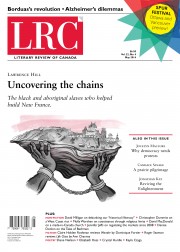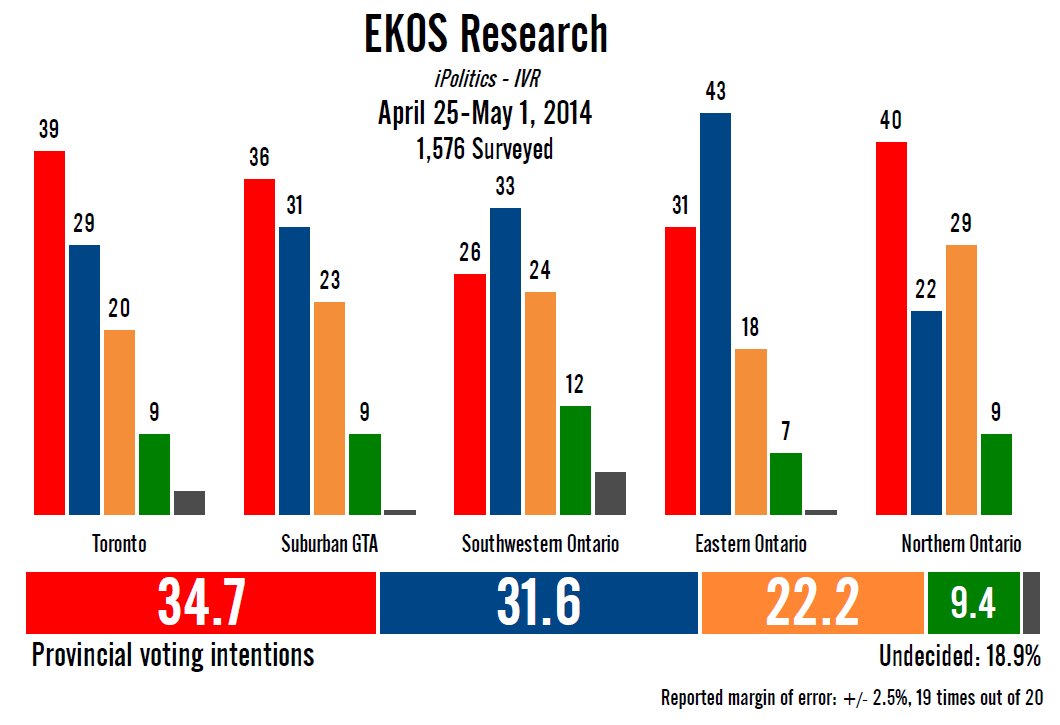Apologies for the light-to-nonexistent blogging. Catherine and I were in Osoyoos BC all week at a Trudeau Foundation conference that kept us busy. Jocelyn is heading off on vacation. The others I have no idea. I do have some things I need to write up in the next few days, but in the meantime, here’s a nice bootleg I found of Canada’s greatest band:
Bruce Wallace, le rédacteur en chef du magazine de l’IRPP Options politiques/Policy Options, m’a demandé au lendemain de l’élection du 7 avril de réfléchir aux causes et au sens du résultat. Le nationalisme québécois est à la croisée des chemins. De nouvelles mouvances se formeront. Je propose une façon d’interpréter l’appui historiquement faible en faveur du projet souverainiste. Mon but n’est pas tant de réfuter l’argumentaire souverainiste que de tenter de comprendre pourquoi il n’est pas très efficace présentement. Je ne cherche pas « à en découdre » avec les souverainistes, mais bien à participer à une réflexion collective sur notre parcours historique et notre situation politique. Le Devoir publie une version abrégée du texte ce matin, et la version complète se trouve dans le plus récent numéro d’Options politiques.
TVO’s Steve Paikin did an “ask me anything” session over at the excellent CanadaPolitics subreddit, mainly about the Ontario provincial election. There was some mildly interesting small talk about the leaders, nothing to write home about. This answer, however, gave me great satisfaction.
Question:
On Monday, I will be delivering a lecture on the Anglophone community in Quebec, at the annual meeting of the Quebec English Speaking Community Research Network.
I was interviewed about it in Le Devoir. The interview is here.… Continue reading
I notice that Dr. Danielle Martin is going to be giving a talk on Monday (May 12) on campus here at the University of Toronto, so to celebrate the occasion I thought I’d discuss Canadian health care for a bit.
Incidentally, for those who don’t follow these things, Dr. Martin recently quickened the pulse of Canadian nationalists everywhere by smacking down a Republican Senator on television:
This video quickly came to occupy a place in the policy wonk’s heart, like an understated version of the “Joe Canadian” rant. (For those of you who missed that one, see here:
One cannot help but be impressed by her poise and self-confidence as she challenges his talking points. At the same time, people familiar with the state of affairs in Canada may have cringed a bit during the discussion of wait times. Because while the Canadian health care system performs very well in certain dimensions, in the area of wait times we are an international underperformer.… Continue reading
The battle lines have now been fairly clearly drawn between the position of the Ontario Liberal Party and the Federal Conservative Government on public pensions. The Liberals would like to expand the government pension program, and since the feds are not willing to expand CPP, they are proposing the creation of an Ontario Pension Plan. The Harper Government is opposed to this, as is the provincial Conservative party. Their view is that people should just save for their own retirements.
This is a line of argument that one hears fairly often, but which upsets my inner economist. (You hear it all the time in the United States – whenever people talk about privatizing Social Security, they propose individual savings accounts as the alternative.) The problem is that it involves comparing apples and oranges. Wynne is saying “we are going to provide oranges,” and Harper is saying “why should people get oranges from the government, when they can just go out and buy apples?” — to which the natural response, it seems to me, is to say “because they want oranges.”
Okay, that’s a bit obscure so let me try to explain.… Continue reading
Dalila Awada, l’étudiante en sociologie qui a brillamment tenu tête à Djemila Benhabib lors d’un débat à Tout le monde en parle en septembre 2013, poursuit des gestionnaires de sites internet ainsi que l’ex-candidate péquiste Louise Mailloux pour propos diffamatoires. Ne connaissant pas particulièrement bien ni la jurisprudence sur la liberté d’expression et la diffamation ni la nature de la preuve déposée, je ne me prononcerai pas sur les détails de ce cas particulier. En plus, je souligne, par souci de transparence, que Dalila est une amie que je respecte et apprécie.
Comme il fallait s’y attendre, certains voient dans sa démarche juridique une tentative de museler ses adversaires idéologiques. Il me semble particulièrement ironique que des critiques de la conception soi-disant trop généreuse de la liberté de religion soutiennent aujourd’hui que la liberté d’expression des intimés est menacée d’une façon inacceptable.
D’un côté, les défenseurs de la Charte de la laïcité ont soutenu que la liberté de religion n’est pas absolue et qu’elle ne doit pas avoir plus de poids que les autres droits fondamentaux.… Continue reading
I just received the latest issue of the Literary Review of Canada.
There is a great review of Joseph’s Enlightenment 2.0 by National Post editor Jonathan Key, as well as pieces on transnational financial regulation, Paul-Émile Borduas and the history of religious freedom in Canada. I also have an essay on one of the most pressing and difficult challenges of democratic politics today : how should we think about the connection between grassroot contestatorary politics and electoral democracy? I discuss, among other things, Stephen D’Arcy’s Languages of the Unheard : Why Militant Protest is Good for Democracy and Philip Pettit’s On the People’s Terms : A Republican Theory and Model of Democracy. Although the title the editors chose—“Democratic Unrest. The Case for Protest, from Cicero to Occupy”—implies that I come down in favour of civil society activism, I actually spend a great deal of time showing that institutions and policies matter a great deal.… Continue reading
Toronto Mayor Rob Ford’s decision to take a time out from his campaign (and his job) to go into rehab obviously came as a great relief to many residents of the city. The thought that we might be able to have a debate about real issues is almost an exciting prospect. (I am also finding the experience of not feeling obliged to vote for Olivia Chow to be somewhat liberating.)
But before we get to that, a few parting thoughts about Ford, because, like everyone else, I can’t resist. (Also, not really parting, because I fully expect him to be back in 30 days. Perhaps “hopefully parting” would be more accurate.)
Many people in Toronto have been shaking their heads this past year and saying to themselves “What have we done to deserve this?” And looking at Ford’s stubbornly high popular approval ratings, many have also been wondering – as my wife put it – “What the fuck is wrong with people in this city?”
So by way of comfort, I want to point out that there is nothing special about Ford, or the Toronto electorate.… Continue reading
So it looks as though we’re going to have a provincial election in Ontario, triggered by the NDP’s refusal to support the budget put forward by the minority Liberal government of Kathleen Wynne. As the recent Quebec experience shows, what happens during an election campaign can matter a great deal. Still, it’s hard to figure out what is going through NDP leader Andrea Horwath’s mind, looking at the latest poll:
(h/t Three Hundred Eight)
There’s a lot wrong with the current situation, and the current government, but it’s hard to see how any of the likely outcomes would constitute an improvement from the NDP’s perspective. (Personally I think a PC government is the most likely outcome at this point.) The only insight I can find is in the following CP wire story:
… Continue readingSeveral large labour groups, including the Unifor union and the Ontario Federation of Labour, urged the NDP to pass the budget and avoid an election, but public sector unions complained the fiscal plan puts jobs at risk.



